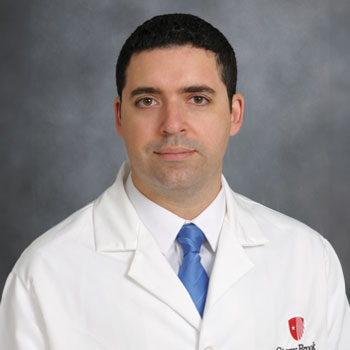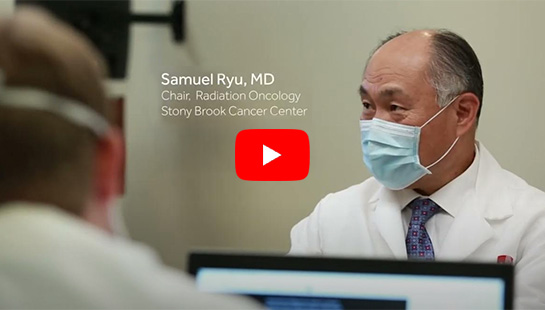When someone is diagnosed with glioblastoma, an aggressive type of brain cancer, the first intervention is surgery. In a clinical trial that is the only one of its kind in the United States, three Stony Brook Medicine physicians have designed a new approach by adding two medical steps before the surgical procedure:
- Receive four treatments of high-dose radiation therapy through stereotactic radiosurgery over two weeks.
- Receive two doses of the immunotherapy drug called atezolizumab, two weeks apart.
This groundbreaking approach would immediately be followed by the standard treatment plan of maximal surgical resection, then six weeks of radiation and oral chemotherapy. In addition, you would continue the immunotherapy with atezolizumab every two weeks.
“It’s a much more aggressive treatment that attacks the cancer from different angles,” said radiation oncologist Alexander M. Stessin, MD, PhD, who designed the clinical trial in partnership with neurosurgeon Charles Mikell, MD and neurooncologist Agnieszka Kowalska, MD. “Our intent with the new approach was to use high-dose tumor-directed radiation, known as stereotactic radiosurgery, in combination with the immunotherapy drug to engage the patient’s immune system to fight the cancer even before the cancer is removed by surgery. We know that with glioblastoma, which is one of the most aggressive cancers out there, even after a surgeon completely removes it, there is a high chance it may come back. The current standard-of-care treatments are often not powerful enough to eradicate the disease. Our multifaceted new approach is based on laboratory data which suggest that engaging the immune system early may be the one chance we have to beat this devastating disease.”
Who is eligible?
This study aims to enroll 12 patients. Currently, there are six enrolled, two women and four men ages 60 and older. The first patient in the trial, a male in his seventies, is now 18 months from diagnosis.
It’s important to note that only patients who have not already had surgery are candidates for the trial. You may be eligible to participate if you:
- have been recently diagnosed with glioblastoma or high-grade glioma, or
- had an MRI showing possible brain cancer and are looking into a biopsy, and
- are 18 years or older.
Next Step: Confirm Diagnosis
Once the criteria is met and you are enrolled in the study, Dr. Mikell will perform a tumor biopsy for confirmation of the disease. If it's a glioblastoma, you’ll be called upon to participate in the following ways:
- Receive experimental infusion immunotherapy and radiosurgery
- Undergo routine surgery and oral chemotherapy
- Undergo MRI imaging with contrast every two months
- Answer questions about your health and medications
- Have frequent physical examinations and blood tests
- Receive standard-of-care, post-operative radiation and continue with the experimental immunotherapy infusions
The study is designed to follow up to three years after the last patient has been enrolled.
“Our trial is multifaceted with a new approach for eradicating glioblastoma. While the six people already participating in our clinical trial are from communities in Suffolk County, where Stony Brook Medicine is located, we welcome candidates from all over the country. This could be quite a turning point for so many down the road,” said Charles Mikell, MD.
This approach by Drs. Stessin, Mikell, and Kowalska is just one of the many unique aspects of the care provided at Stony Brook Cancer Center, where doctors can create their own clinical trials to benefit people who have been diagnosed with cancer.
For information on this clinical trial, please contact:
- Cancer clinical trials at 631-SB-TRIAL (631) 728-7425 or email CancerClinicalTrials@stonybrookmedicine.edu or
- Department of Neurosurgery at (631) 444-7328 or
- Department of Radiation Oncology at (631) 444-2210





